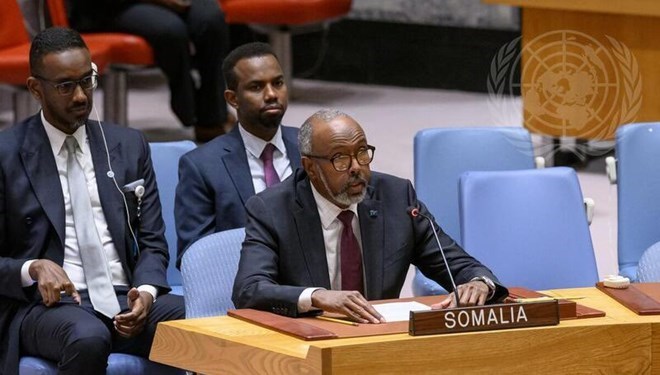
Thursday January 2, 2025

FILE - Somalia’s Permanent Representative to the United Nations, Ambassador Abukar Dahir Osman (Abukar Baalle), delivers a statement during a United Nations Security Council session. (UN Photo)
The election on June 6, 2024, saw Somalia secure 179 votes in the UN General Assembly, representing East Africa in an uncontested bid. Somalia joins Denmark, Greece, Pakistan, and Panama as new non-permanent members, replacing outgoing nations Ecuador, Japan, Malta, Mozambique, and Switzerland.
advertisements
James Swan, the UN Secretary-General's Acting Special Representative for Somalia, commended the nation's progress and stated, "Somalia has come a long way over the past three decades on its path to peace, prosperity, and security."Somalia's position on the 15-member council grants it a voice in decisions related to international peace and security, including sanctions, peacekeeping operations, and the use of force. Speaking about this opportunity, Somalia's UN Ambassador Abukar Dahir Osman (Abukar Baalle) expressed the nation's commitment: "We are determined to uphold the UN Charter and to contribute actively to safeguarding global peace and security."
The development comes as Somalia navigates a web of complex internal and external challenges. Externally, the contentious Ethiopia-Somaliland Memorandum of Understanding (MoU), signed in January 2024, forced Somalia to go on a diplomatic offensive to foil the deal. The agreement, which grants Ethiopia access to the Berbera port in exchange for recognizing Somaliland's independence, challenges Somalia's sovereignty, as Somaliland is considered a breakaway region by Mogadishu. The Ankara Agreement, brokered by Turkey in December 2024, has greatly impacted regional dynamics. The accord led Ethiopia to walk back its earlier MoU with Somaliland while supporting Somalia's territorial integrity and opening an avenue for Ethiopia to access the Red Sea through Somali ports, pending further technical discussions.
Domestically, the federal government continues to struggle with limited control over vast territories, facing resistance from Al-Shabaab militants and ongoing disputes with regional federal member states like Jubbaland and Puntland. In November 2024, Jubbaland suspended relations with the federal government, accusing it of undermining regional autonomy, while Puntland has expressed persistent dissatisfaction with federal leadership, complicating efforts to unify governance structures.
Ambassador Baalle, who has been widely praised for his contributions to Somalia's diplomatic recovery, called the election a "diplomatic victory" that reflects the country's progress.
While Somalia's election underscores its external sovereignty—the recognition of its statehood by the international community—it also highlights the disparities in its internal governance. Analysts note that the federal government continues to grapple with limited control over its territory, with Al-Shabaab, Somaliland, and other regional actors wielding significant influence.
Somalia's last tenure on the Security Council was in 1971. Since then, decades of civil war and political instability have hindered its global presence. The election is a testament to its resilience and determination to reassert itself in international affairs.